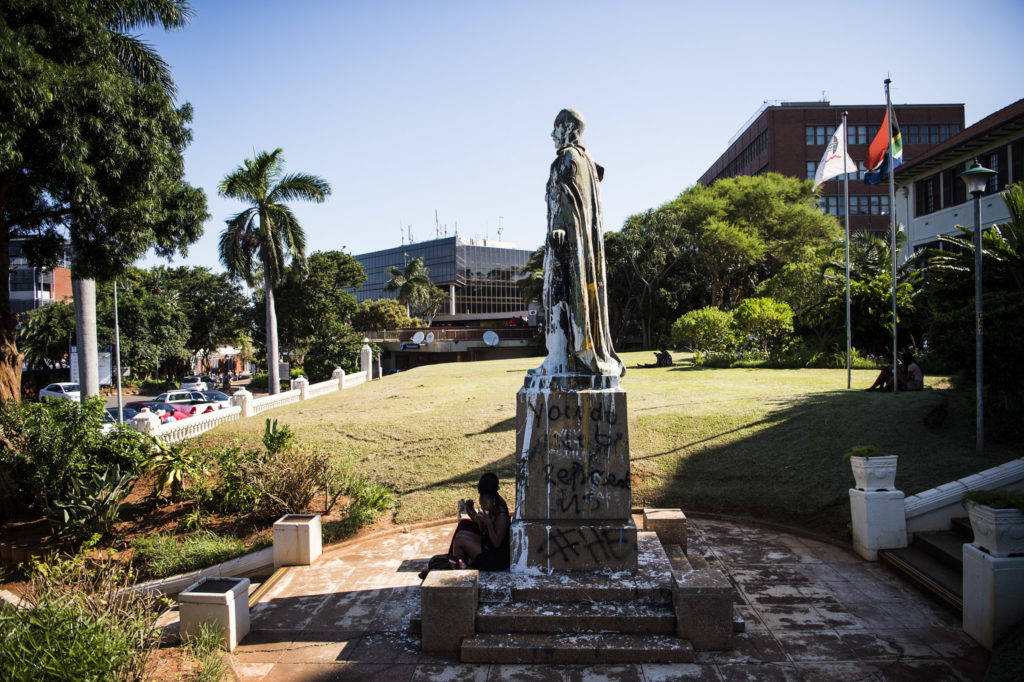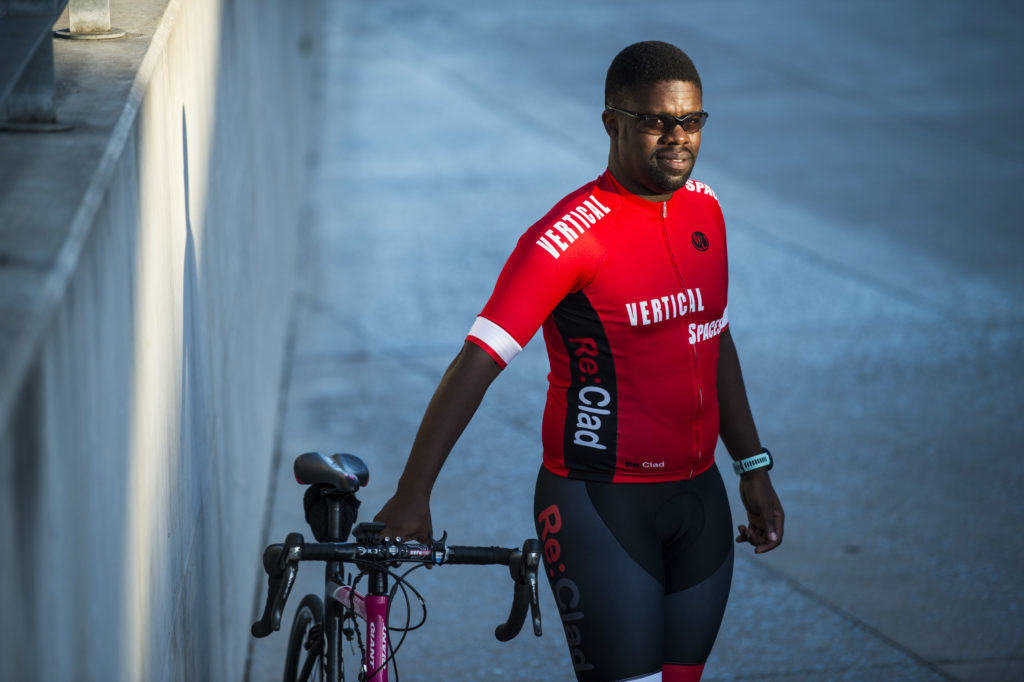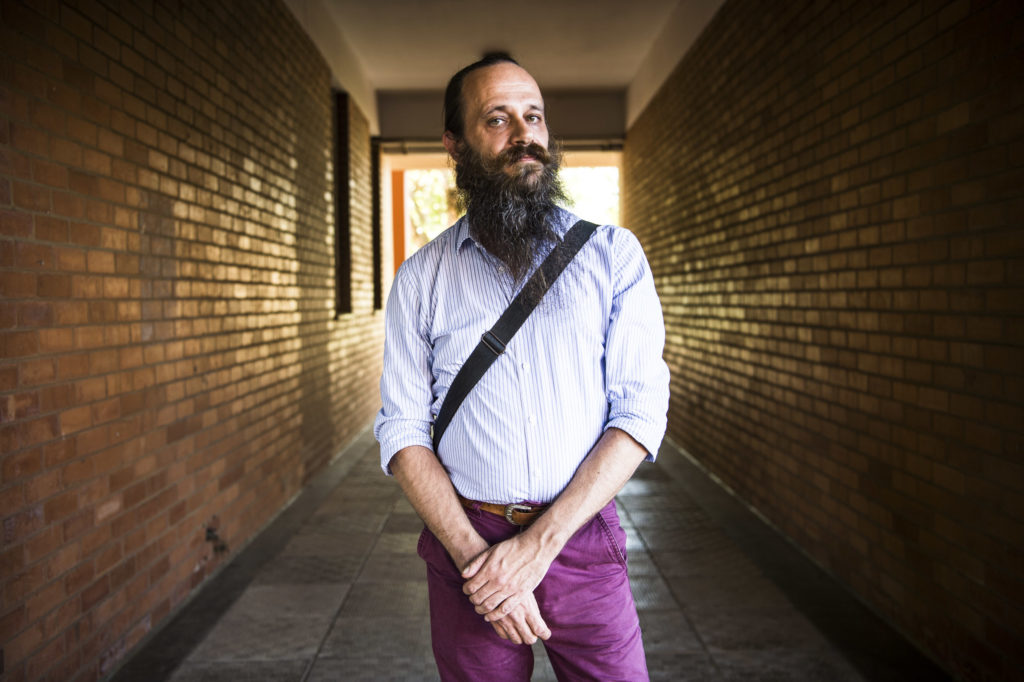University of Choice: With private security on site, UKZN management and the SRC seem to be working towards a solution. (Delwyn Verasamy)
A young couple is leaning against the wall of a lecture hall, kissing. They stop, smile and look at each other. The girl then plants another kiss. A few steps away, a group of three girls takes a selfie. A few metres away, a young man in white shorts, designer sneakers and a bright yellow T-shirt is posing for pictures as his friend clicks away on her phone.
The quad where students come for food at the Westville campus of the University of KwaZulu-Natal (UKZN) is a hive of activity. The special today is a mutton burger with chips for R20. Students sit in groups, talking and laughing. Others walk up and down with earphones on. There is a waft of dagga in the air.
At face value, things seem calm.
But the quad is also occupied by groups of men in red hard hats and bulletproof vests, carrying paintball guns. Their eyes follow the students. The black Nyala armoured vehicles, sit at one end of the quad, not far from the private security personnel.
The presence of these men on campus follows violent student protests at the institution that started on January 27. Several buildings were set on fire across campuses and an elderly emeritus professor was assaulted.
 A vandalised statue on Howard Campus. (Delwyn Verasamy)
A vandalised statue on Howard Campus. (Delwyn Verasamy)
Vice-Chancellor Professor Nana Poku wrote in The Mercury this week that the estimated damage to property is R31-million.
Private security and their vehicles dot the campus, parked in bushes and next to the trees that help make this campus look so green. Other personnel are stationed at administrative buildings.
Deputy chairperson of the UKZN Staff Union, Mandla Mdluli, says there are also armoured vehicles on the Pietermaritzburg campus. But he says the deployment of private security on campus does not solve the problems. “What is the plan?”
 Mandla Mdluli, deputy chairperson of the UKZN Staff Union. (Delwyn Verasamy)
Mandla Mdluli, deputy chairperson of the UKZN Staff Union. (Delwyn Verasamy)
“The only thing that one expects is that we might wake up and there is riots and chaos on campus again. We are operating on autopilot,” he says.
At the heart of the unrest at UKZN are students’ demands for funding, the lack of accommodation, and academic exclusions.
The first statement that the student representative council (SRC) issued on January 27 focused largely on student funding. The SRC has been calling for students whose family income is less than R350000 a year and/or those who are funded by the National Student Financial Aid Scheme (NSFAS) or other bursaries to be allowed to register without paying their debt, but instead sign an acknowledgment of debt form. They also called for students to be allowed to register without paying the registration fee.
The Mail & Guardian contacted SRC president Sifiso Simelane to discuss its demands and expectations about what the university should deliver, but he failed to meet us.
The M&G had also requested an interview with one of the university’s executives but was turned down.
In a statement on January 27, the university hit back, saying that although it was in talks with students, some of their demands “would not be feasible for the long-term viability of the university”.
The university said the students who the SRC wanted to be allowed to register without paying towards their historical debt comprised 78% of the student body. UKZN also said that it already had student debt of R1.7-billion.
The university also said: “It is worth noting that 67% of the student population are eligible to register without making any payments for registration fees. These are students who are current beneficiaries of NSFAS, or the university’s financial aid, or sponsorships from private and public organisations.”
With no solution in sight, the violence continued.
On February 3, the university issued another statement. It was short, to the point and the tone had changed slightly.
In this statement, the university simply said that it would be left bankrupt if it acceded to the demands of the students. “We cannot act in a way that is destructive of the university’s very foundations and would be self-defeating for the entire student body and future generations. The university cannot concede to what it cannot afford.”
On the same day, the SRC hit back and said the university would remain on shutdown until its demands were met. They referred to Poku and his executive management as arrogant.
“As student leadership we vow that their behaviour will be met with the same arrogance,” the SRC said.
The student body also quoted Frantz Fanon: “When we revolt, it is not of a particular idea, we revolt simply because for many reasons we can no longer breathe.”
The students maintained their demands. The protest continued. Buildings were torched, without the SRC condemning this in any of its statements.
Professor Erwin Brüning, 77, is a maths researcher at the university. On February 20, a video showing him being assaulted, allegedly by students, circulated on social media.
UKZN interim branch secretary of the National Tertiary Education Union, Gareth Amery, told the M&G this week that Brüning is an old man, who is deaf, and who was on campus to work on his passion.
 Gareth Amery, UKZN interim branch secretary of the National Tertiary Education Union (Delwyn Verasamy)
Gareth Amery, UKZN interim branch secretary of the National Tertiary Education Union (Delwyn Verasamy)
“He always comes to work at six in the morning. He doesn’t teach any more — he’s retired. All he does is he comes to work and writes some papers and then when the paper gets published, the university gets some subsidy. In his mind he thought, ‘This is not my issue, I’m just going to work.’ But the kids, of course, wouldn’t have seen that.”
On the same day that Brüning was attacked the university sent out yet another statement condemning the act. There was no comment on the attack from the SRC.
The university also announced that it was working on “various fundraising initiatives” to assist the students and that registration had been extended to March 6.
The staff union’s Mdluli says the staff morale is low and staff do not feel safe, even though the violence has abated. “It could have been worse. Those buildings could have been torched with people inside.”
Amery says he has been teaching at UKZN since 2003. And protest is not new. Arson has taken place there before. “Personally, I have had lectures disrupted, but I haven’t been physically assaulted or intimidated. But then, we’ve learned these skills … You know, management says we are open, so we have to teach. So you rock up and you teach but when the people with the covered faces come in you don’t resist, you just close up your laptop and go away.”
He says it is “very, very challenging” to work in a space in which you cannot guarantee your safety.
After a special council meeting on Monday it does appear that the university and the SRC are beginning to find each other on certain issues.
After the council meeting, the SRC released a statement saying that council had agreed that of the 15% students with historical debt who have not registered, the 1435 who are funded by NSFAS for 2020 should be allowed to register and sign an acknowledgement of debt form.
The SRC said it had also offered R4-million of its budget to assist some of the students who still cannot register.
On Wednesday the council — the university’s highest decision-making body — sent a communiqué to staff and students saying that the 1435 NSFAS-funded students owe R72-million in historical debt and that council had decided that different stakeholders in the university need to raise funds to help these students pay their debt before they register.
However, the university has emphasised that it will not provide free education to every unfunded student when even the government does not fund all students whose family income is below R350000.
The university has said that 85% of its students are registered and are attending classes.
But until a solution is found for the remaining students, people like Mdluli are not convinced that the war between the institution and the student body is over.